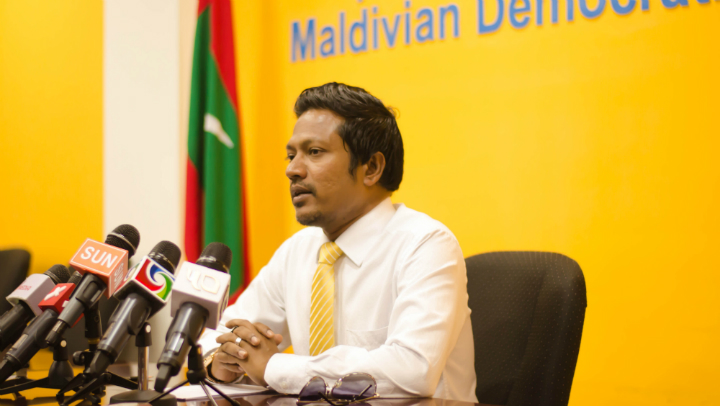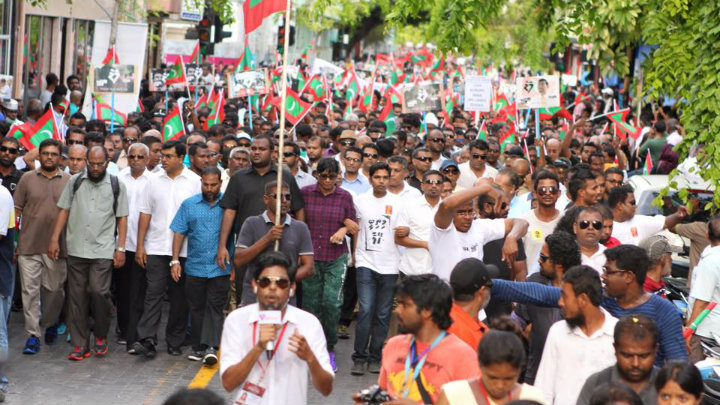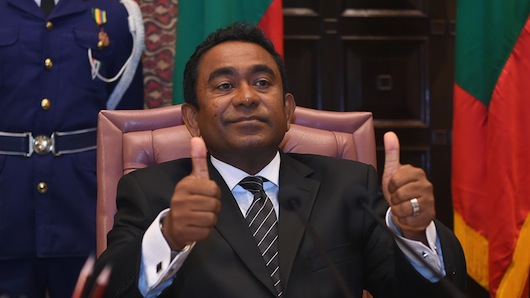Former President Mohamed Nasheed was temporarily obstructed from traveling overseas yesterday (April 14) despite having High Court approval, the opposition Maldivian Democratic Party (MDP) has alleged. Nasheed’s office has said this is the fourth time over the last 12 months that he has faced restrictions on his travel.
The High Court had granted Nasheed permission to travel abroad yesterday, while Maldivian authorities were informed of his planned departure to Copenhagen, Denmark, at 7:30pm in the evening, MDP MP and Spokesperson Hamid Abdul Ghafoor claimed today.
However, an hour before Nasheed’s scheduled departure – after he had arrived at Ibrahim Nasir International Airport (INIA) in Male’ – his office said they were informed Nasheed could not leave the country.
The Department of Immigration and Emigration were then accused of preventing Nasheed from leaving the Maldives, claiming the High Court had not granted him permission to travel overseas before April 15.
After Nasheed’s flight departed, the Immigration Department then granted their official permission, Ghafoor said.
Nasheed then rescheduled his flight and departed the Maldives for Copenhagen at 11:40pm on April 14.
Ghafoor added that this was the fourth instance where Nasheed has been obstructed from traveling abroad on a scheduled international visit under the present government.
He explained that “everything was scheduled properly and there was no controversy from the High Court,” instead the issue lies with the Immigration Department.
“The Immigration Department will not stop trying to find any little administrative mistakes – and when they can’t, they invent something. They will most likely quote an administrative error on the part of Nasheed’s staff,” said Ghafoor.
“President Nasheed has not been shown the courtesy a former head of state deserves,” he added.
Nasheed’s spokesperson, Mariya Didi echoed these sentiments stating: “As a former President, it deeply concerning that the Maldivian authorities continue to withhold the constitutionally stipulated privileges accorded to President Nasheed.”
When asked about Nasheed’s travel arrangements, Immigration Controller Dr Mohamed Ali told Minivan News today to “ask the MDP about it,” adding he would not comment on any instance of the former president being obstructed from traveling overseas.
Climate change, economics, and democracy
While in Denmark, Nasheed has been invited to speak at the University of Copenhagen on the economics of climate change.
His office has said he will speak on outlining the dangers posed to the Maldives by climate change, and explain how the world can build a carbon neutral global economy by focusing on the opportunities provided by clean technology.
The investments for producing sustainable energy in the Maldives are now viable, Nasheed told local media prior to his departure yesterday.
Ghafoor said that Nasheed plans to speak at the Danish Parliament and meet with ministers during this “rushed but comprehensive trip”.
“He’s not a green man per se, but rather supports economics of the green movement,” he added.
Nasheed told local media that his parliamentary speech will highlight how the Maldives has deviated from democratic principles and the efforts necessary to put the country “back on track to democratic governance”.
Nasheed is scheduled to return April 18.
Previous travel bans
Earlier this year,the Hulhumale’ Magistrate Court denied former Nasheed’s request to travel abroad for a family wedding from March 27 to March 31.
Meanwhile, Nasheed’s request to travel overseas between February 27 to March 5 was denied by the Hulhumale’ Magistrate Court because “he had not cooperated with the court on previous instances”. The trip had been scheduled after Nasheed received an invitation from the Commonwealth Secretary General Kamalesh Sharma, and to Denmark under an invitation from the state.
Nasheed was also prevented from leaving the country December 21, 2012 to visit his ill father in Bangkok, Thailand due to a “technical problem,” the Department of Immigration and Emigration has claimed.
Earlier in 2012, the Hulhumale’ Magistrate Court imposed an internal travel ban “confining Nasheed Male’,” which he said will hinder his political campaigning and wider party work.
Copenhagen climate justice advocacy
Nasheed galvanised thousands of environmentalists at a 350.org rally in Copenhagen December 2009, vowing to persevere until a politically binding climate change treaty was attained.
The Danish Prime Minister called Nasheed “the real hero of Copenhagen” following a marathon 30 hour negotiation session to reach an agreement during the 2009 UN Framework Convention on Climate Change (UNFCCC) talks.
The agreed-upon accord recognises that global temperatures should rise no higher than two degrees Celcius above pre-industrial levels, but does not commit developed countries to legally-binding emission reduction targets.
Current carbon-neutral commitments
The current government of President Mohamed Waheed Hassan Manik has said it is committed to pursuing carbon neutral ambitions, despite last year’s political tensions reportedly affecting investment potential for such schemes.
Environment Minister Dr Mariyam Shakeela said last year that some of the programs presently being undertaken by her ministry had started seven years previously – before Former President Mohamed Nasheed came to power – and were being adhered to on the grounds they would benefit the nation.
“We are continuing with the carbon neutrality program,” she said at the time. “ We are giving it our best shot.”
Since early 2012, the Maldivian government has overseen the initial stages of a few new renewable energy projects to achieve this goal.
The Maldives’ State Electric Company Limited (STELCO) announced in March 2013 plans to implement a 50 megawatt floating solar panel project to power the country’s capital Male’ and provide renewable energy for 28 islands with rooftop installations.
The Ministry of Environment in conjunction with the Ministry of Finance issued a prequalification application in January 2013 for the “Solar Maldives Programme.” The project aims to “design, build, finance, own, operate and transfer grid-tied solar photovoltaic systems for integration with diesel generators on 15 islands” in the south, north, and upper north provinces.
The government has also received bids to install a 300 kW grid connected solar PV system on Thinadhoo Island, the regional capital of Gaaf Dhaal (Huvadhoo) Atoll. This is part of the “Clean Energy for Climate Mitigation (CECM) Project” financed by the Climate Change Trust Fund (CCTF) – a collaboration between the Maldivian government, World Bank, European Union (EU) and the Australian Agency for International Development (AusAID).
“The system is expected to meet 30 percent of the peak day time demand of electricity and will offset approximately 300 tons of carbon dioxide annually,” the Ministry of Environment previously claimed.
The Waheed administration has also announced its intention to move ahead with plans to transform the Maldives into a biosphere reserve through the designation of zones across the country that would earmark land use for specific purposes such as tourism development or conservation.
Likes (0)Dislikes
(0)Dislikes (0)
(0) 

